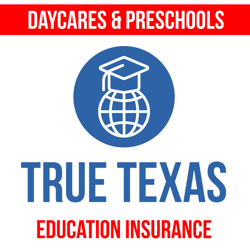Key Takeaways
- Why State Compliance And Insurance Inspections Are Different
- What Inspectors Look For
- The Consequences Of Each Inspection
If you'd like to dig a little deeper, there are FAQs at the bottom of the page.
Child care licensing and child care regulation seems like an endless maze of paperwork. It can feel like it's own full time job that few people truly enjoy. Mary dreads this part of her child care operations, but feels prepared when her child care license needs to be renewed.
She is meticulous with her inspection records. Her staff files, including background check records, are in order. Student to Teacher Ratios are managed carefully. Health records are updated. She knows the inspectors are coming to check compliance, and she has a process to get through it. Even if she doesn't like it.
She had bought a new daycare insurance policy for her Fort Worth center. When she got a call about a daycare inspection for the policy, she did not worry. She thought it would be just like the licensing visits she already knew.
The inspector arrived, greeted her politely, and began looking around. But instead of asking for staff records, he went straight to the roof. He checked the playground. He examined the fire extinguishers and the kitchen area.
Mary was surprised. This was not at all what she expected. A couple of weeks later she received a notice from the agent. The inspector had flagged several issues that had nothing to do with licensing but everything to do with financial risk. They requested that changes and updates to first aid kits, fire extinguishers, and electrical panels.
That was when Mary realized something important. Insurance inspections are not the same as state licensing inspections. She saw how these safety hazards were different but also necessary!
Why State Compliance And Insurance Inspections Are Different
To Mary, inspections had always meant the same thing. Someone checks your daycare to make sure you are doing the right things. But the truth is that Texas Child Care Regulation inspectors and daycare insurance inspectors come for very different reasons.
State licensing inspections are about compliance with laws. Texas Health and Human Services requires licensed daycares to follow Child Care Regulation statutes. Inspectors are there to verify that caregivers meet minimum standards for safety, training, staffing, and child care practices. Their job is to protect children by making sure daycares are following the applicable laws.
Insurance inspections are about the financial risk child care operations. Insurers want to know how likely it is that your daycare will file a claim that can cost money. They are not evaluating you for compliance with state law. They are evaluating whether your daycare will cost them money in the future through a child injury claim or a problem with your property. That difference changes everything about what they look for and how they report their findings.

What These Inspectors Actually Look For
Mary thought she knew what an inspection involved because she had gone through them many times before. She expected questions about staff background checks and the safety measures used in her child care program. Instead, she watched the inspector climb onto the roof, measure the playground fence, and check on the electrical breaker panel.
State inspectors focus on how children are cared for by child care providers. They check staff-to-child ratios. They verify background checks are completed. They review feeding instructions. They check crib safety standards. Their focus is the daily operations that directly affect children’s health and safety.
Insurance inspectors care about the condition of your property and the risks it presents. They may look at your roof and determine how much life it has left. They may do a fire inspection, including extinguishers and alarms. They inspect playground equipment to see if it is safe and properly maintained. They walk through your kitchen to make sure it does not present a fire hazard. They pay attention to maintenance and repairs that could become large claims later.
Mary realized that while both types of inspections are important, they are not interchangeable. Passing a state inspection does not guarantee that an insurance inspection will go smoothly.
The Consequences of Each Inspection
After Mary’s insurance inspection, she was shocked to see the notification of updates needed. She had passed her last state inspection without any deficiencies, so she thought everything was fine. What she learned was that the outcomes of these inspections are very different.
State inspections result in deficiencies being posted online for parents and the public to see. These deficiencies can hurt your reputation and may result in corrective actions or penalties if not resolved. Parents may think twice about enrolling their children if they see repeated violations.
Insurance inspections can result in financial consequences, especially if deficiencies identified are not corrected in a timely fashion. The insurer can raise your premiums, add exclusions, increase deductibles, or even cancel or decline coverage. The issues are not posted publicly, but they directly affect your ability to secure and maintain affordable daycare insurance.
For Mary, she wanted to maintain a safe child day care center and keep her insurance costs as manageable as possible. She now understood that inspections could affect her bottom line as much as her reputation. She took care of those items quickly so that her child care staff could focus on continuing to provide top notch care to their children.
Protecting Your Daycare From Both Sides
Mary decided she needed to treat the two types of inspections separately. For child care licensing, she continued focusing on staff training, documentation, and compliance with child safety standards. For insurance inspections, she worked with her agent to address building maintenance, roof condition, and fire safety systems ahead of time.
When she renewed her insurance the following year, the difference was clear. The insurer saw improvements in the inspection report and offered her better terms. At the same time, she passed her state licensing visit with no deficiencies. By preparing for both inspections in the right way, Mary saved money and kept her reputation strong.
Daycare owners across Texas need to take the same approach. You cannot assume that passing one inspection guarantees you will pass the other. Each serves a different purpose and both affect your ability to run a safe and successful daycare.
The Next Step for Texas Daycare Owners
Child care facilities operate on tight margins. Small mistakes can lead to big financial consequences. Passing your state inspection keeps you compliant with the law. Passing your insurance inspection helps keep your coverage affordable and reliable. Both are necessary if you want to protect your business, your staff, and the families who rely on you.
That is why True Texas Education Insurance was created. It is a program built specifically for child care programs, centers and preschools in Texas. Our experienced insurance agents know the difference between state compliance requirements and insurance inspection expectations. We can help you identify risks, close coverage gaps, and prepare for the kinds of inspections that affect your premiums.
👉 Click the button below to talk with a Texas-based daycare insurance expert today and learn how to prepare for your next insurance inspection.
FAQs - Frequently Asked Questions
What is the main difference between a state daycare inspection and an insurance inspection?
State inspections are about compliance with child care laws set by Texas Health and Human Services. Inspectors check things like staff ratios, background checks, crib safety, and feeding records to make sure children are cared for properly. Insurance inspections focus on financial risk. Inspectors evaluate property conditions, fire safety systems, roofs, and playground equipment to decide how likely your daycare is to file costly claims.
What happens if my daycare has deficiencies in an insurance inspection?
Unlike state deficiencies, which are posted online for parents to see, insurance deficiencies affect your premiums and coverage directly. If issues are not corrected quickly, your insurer may raise your premiums, add exclusions, increase deductibles, or even cancel your coverage. While not public, these inspection results have a big impact on your ability to maintain affordable insurance.
How can daycare owners prepare for both types of inspections?
Daycare owners need to treat them separately. For state licensing, focus on training staff, maintaining documentation, and following child safety standards. For insurance inspections, address property upkeep, roof conditions, fire extinguishers, and maintenance before the inspection. By preparing for both, you protect your reputation with parents and your premiums with insurers.



